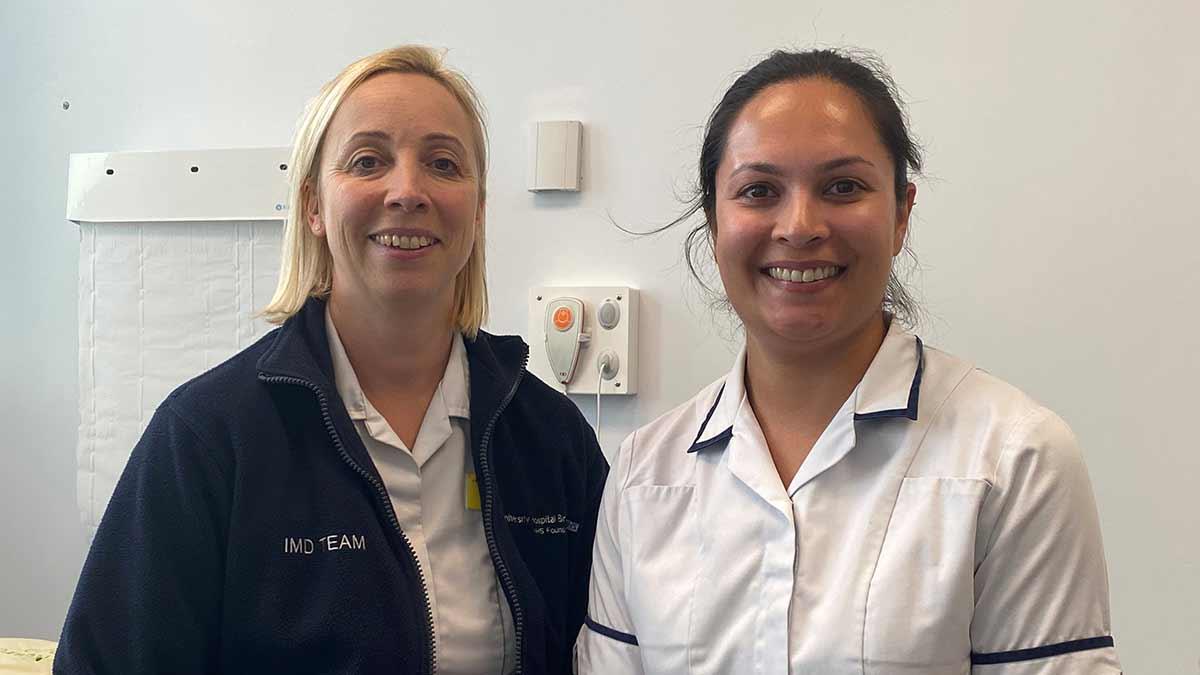Patients with rare disease offered UK's first online exercise classes
Published on 24/06/2024

Queen Elizabeth Hospital Birmingham (QEHB) is the first hospital in the country to run virtual exercise classes for patients with a very rare disease.
Patients who have a genetic condition, called Pompe disease, join the classes from places as far apart as Cornwall and the East Midlands.
Pompe disease, classified as glycogen storage disorder type II, is a rare metabolic condition which causes progressive muscle weakness, especially in muscles closest to the spine and core.
Typically, patients have problems walking and may eventually need a wheelchair. They can also have breathing difficulties.
There is a lifelong treatment, enzyme replacement therapy, and physiotherapy can also help to address some of the symptoms of pompe disease, such as pain, muscle weakness and fatigue.
The Inherited Metabolic Disorder Service, at QEHB, is one of only a few centres nationally which treat people with rare metabolic conditions, such as Pompe disease.
There are only about 200 patients with Pompe disease nationally and because it is so rare, people can have problems accessing local services for support with physiotherapy and exercise.
The online classes at QEHB started last year with a physiotherapy expert leading the group. They are proving a fantastic way to bring these patients together to support each other.
Those who have taken part have reported improvements in their movement. Some patients have described finding it easier to get up the stairs or they may be able to walk further than before or feel like they have more energy.
Others say their overall fitness has improved and their balance is better. They also like the benefit of being able to do the exercises in their own homes.
Nicola Condon, a Clinical Specialist Physiotherapist, who leads the sessions, said the classes had been launched as a trial but had proved very successful. She is now looking to encourage more patients from the QEHB clinic to join in.
Going forward, this type of virtual exercise class, via MS Teams, could also be offered to patients with other rare metabolic conditions.
Nicola said: “It’s a good way of supporting patients and building their confidence with exercise. The virtual exercise classes provide an opportunity to come together to exercise, which hasn’t been possible before as they live so far apart.”
Two virtual classes are being run for different levels of ability in weekly 60-minute sessions for blocks of six weeks.
There is a seated exercise class that’s suitable for everyone and can be adjusted to meet people’s individual needs.
There is also a seated and standing exercise class that has a mix of posture, balance, core strength and cardio exercise.
Nicola and colleagues Rachel Curran, Senior Physiotherapist, and Jade Desai-Proctor, Senior Physiotherapist run the virtual classes.
Elle McNally, one of those joining the classes, said: “One of the biggest benefits I find from doing this exercise class weekly, is the amount of energy I find myself with afterwards.
“To go from feeling very fatigued more than half of the week, to find myself with energy to complete additional physical tasks has honestly made such a big difference on my life as I am able to get involved in more social situations and regularly babysit for my nephew.”
There are only six other adult metabolic centres which run clinics for people with Pompe disease, but none have a virtual exercise programme. Some have indicated they may look at following QEHB’s example.
Pompe is a type of glycogen storage disease (GSD). Glucose, a major source of energy for the body, is stored in the form of glycogen in both the liver and muscles and later released with the help of enzymes.
Persons affected have an inherited defect in one of the enzymes responsible for forming glycogen, or for releasing glucose from glycogen as it is needed by the body.
If you are interested in the clinics, please email or phone.
Email Nicola.condon@uhb.nhs.uk


